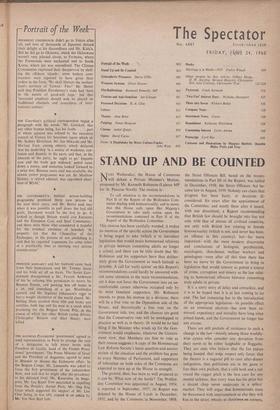—Portrait of the Week — PRESIDENT EISENHOWER didn't go to Tokyo
after all, and tens of thousands of Japanese danced their delight at his discomfiture and Mr. Kishi's. But he did go to Okinawa, which the Okinawans weren't very pleased about; to Formosa, where the Formosans were enchanted and to South Korea, where joy was unconfined. The Chinese Communists expressed their disapproval by shell- ing the offshore islands: some battery com- manders were reported to have given their orders in the form, 'We shall liberate the mother- lands territory of Taiwan : Fire!' Mr. Herter said that President Eisenhower's visits had 'been in the nature of good-will trips.' but that 'increased emphasis should now be placed on traditional channels and procedures of inter- national contact.'
THE Guardian's political correspondent began a paragraph with the words, 'Mr. Gaitskell, like any other human being, has his faults . . .', part of which opinion was echoed by the executive council of Victory for Socialism (upon which sit Mr. Sydney Silverman, Mr. Ian Mikardo and Mr. Michael Foot, among others), which declared that his leadership 'is a source of weakness, con- fusion and disunity in the party and that, in the interests of the party, he aught to go.' Imports rose and the trade gap widened; petrol came down a penny, and motorists looked forward to a price war. Because more coal was available, the atomic power programme was cut. Sir Matthew Slattery, a retired admiral, was appointed chair- man of BOAC.
*
THE GOVERNMENT'S belated prison-building programme promised thirty new prisons in the next three years, and Mr. Butler said that when it was possible to pull down the bad old gaols, Dartmoor would 'be the first to go. It looked as though Britain would join Euratom and the European Coal and Steel Community; and there were those who considered it hopeful for the eventual abolition of Schedule 'A' property tax that the Chancellor of the Exchequer, in the process of not abolishing it, said that he regarded 'arguments for some relief at a practicable time as meriting very serious consideration.'
*
PRINCESS MARGARET and her husband came back from their honeymoon, and Mr. Tommy Steele and his bride set off on theirs. The Soviet Gov- ernment disappointed a Mr. Francis Anderson of his by refusing him permission to marry his Russian fiancde, and packing him off home in a jet, and something of a pet. Wimbledon opened. and Mr. Ingemar Johansson's reign as heavy-weight champion of the world closed. Mr. Stirling Moss cracked three ribs and broke one vertebra; both legs and his nose in a crash while practising for the Belgian Grand Prix, in the course of which two other British racing drivers, Christopher Bristow and Alan Stacey, were killed.
*
THE ALGERIAN Provisional 'government' agreed to send representatives to Paris to arrange the visit of a delegation to talk peace terms with President de Gaulle, head of the French Provi- sional 'government.' The Prime Minister of Israel and the President of Argentina agreed to meet in Brussels to discuss the Eichmann affair. In the Belgian Congo, Mr. Lumumba was asked to form the first government of the independent State, and said that he might offer the presidency to his defeated rival, Mr. Kasavuhu. In Singa- pore, Mr. Lec Kuan Yew succeeded in expelling from the People's Action Party Mr. Ong Eng. Guan which suggested the support of Mr. Lim Chin Soing, as was ably argued in an article by Mr. Ver Non Bart Lett.




















 Previous page
Previous page